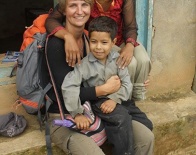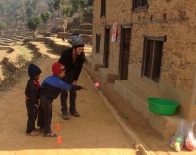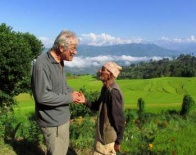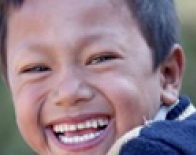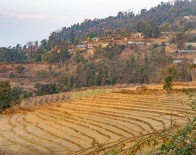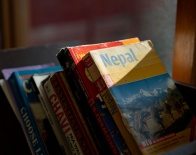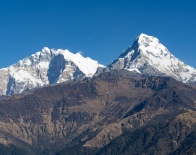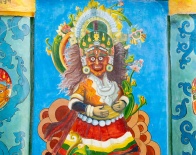Volunteering
We warmly welcome volunteers who would like to come and help our school and the rural community of Saping. We are located a 3 hours bus-ride plus a 2 hour walk from Kathmandu. This is a beautiful area of Nepal with mountain views and rice-terraces.
Background
The school started 15 years ago and offers completely free education to students. We have a special focus on educating children from poor families; some of our students walk 2 hours a day just to get to and from school. Our village was badly impacted by the earthquake; around 70% of our students lost their homes.
Volunteer Positions
We're primarily looking for volunteers who are willing to teach, however, our volunteers can combine teaching with some farming, cooking or building if they want to. Here are our volunteer roles:
We're looking for people who can help teach English, health, science, art, do creative projects, or teach any other subject that they're interested in. You don't have to be a qualified teacher, but we'd like it if you're a native English speaker or have an advanced level of English.
If you're a qualified teacher, we're very open to the idea of you doing a workshop with our teachers, to help us improve our standard of education. We have a particular interest in improving health and hygiene in the school and village this year, so if you have an interest in this kind of education, we'd love to hear from you.
Volunteers can also help with agriculture work, because Saping is a village where people grow almost all the food that they eat. (However, there is not much farming work available in winter, from December to February).
We have a couple of carpentry projects that need to be done at the school so we would love to have a carpenter come. The school was damaged in the earthquake, so we are going to repair the damage during 2016, and also have other little projects that need doing.
You could also help in the kitchen, or help with the volunteer program by answering emails from volunteers, and making sure the calendar is up-to-date.
We're open to any other ideas volunteers might have, so if you have a project in mind, please just email us and we'll let you know if it's something that would suit us.
Volunteers usually work from 2 to 5 hours per day, 6 days a week. (The school runs from Monday to Saturday, with a half-day on Friday). We would like it if volunteers could commit to a minimum 2-week stay. We don't accept volunteers during the school holidays, which are for the months of April, July, and October.
Accommodation and Food
We have three rooms on the first floor of the school. You'll have a private room and the area is quiet at night. One of the rooms is quite cozy and private, and the other two are in a hall which has been partitioned.
We have mosquito nets for the beds (a double net and two single nets), which are useful from April to September, when there are mosquitos and other bugs around. The construction of the bedrooms is basic - they just have a corrugated-iron roof, and if it's cold or hot outside, it will also be cold or hot in the rooms. There is electricity in the rooms, but (as with all of Nepal!) there is no heating available during winter.
The bedding is mattresses on the floor, with a foam pad underneath. The mattresses are quite comfortable - kind of like sleeping on a futon mattress. We have plenty of blankets and some light-weight sleeping bags.
We have solar hot water for showers and a kitchen in the school. We provide the traditional Nepalese food of Dahl baht twice a day, with tea and biscuits twice a day as well.
The bathroom is shared with volunteers and teachers, is very basic, and has an Asian-style squat toilet.
We don't have Wifi, but you can put a local SIM card in your phone to use internet if you want to. (We can help you with this if you are new to Nepal.)
There's a small store 30 minutes walk from the school which sells basic items like phone recharge, biscuits and soap, but any other stores are 1.5 hours walk away in the town of Dhologhat. (There are always people walking to the small store or Dhologhat, so we can bring items to you if needed.)
Because Saping is a rural, non-touristy village the living standards (eg the bathroom) are lower than in Western countries. The volunteers that most enjoy their time with us are adaptable, flexible and self-motivated. We're very welcoming, however if this is your first time traveling outside a Western country then Saping may not be the right choice for you.
How to get to the School
From Kathmandu to Saping takes around 3 hours on a bus plus a 2 hour guided walk.
Our guesthouse in Dhulikhel is on the way to Saping from Kathmandu, so volunteers usually go to the guesthouse first and then we take you to Saping from there. To get to Innate Pension, in Dhulikhel, you catch a bus from Ratna buspark in Kathmandu to Dhulikhel (1.5 hours) and then walk 15 minutes up the Battedanda Road (towards Battedanda village) and you'll see the guesthouse. It's a big, red, brick building on the right-hand side of the road. Then the next day we will take you on a 1.5 hour bus ride to Dhologhat and a 2 hour guided walk up the mountain to Saping. The walk to the village is steep, so you are welcome to leave excess luggage at the guesthouse.
Payment
Because we provide free education to children (through the support of overseas donors), we ask our volunteers to pay US$6 a day to cover food and electricity.
Cultural Exchange and Challenges
Volunteers will get a real insight into traditional rural Nepalese life by staying with us. Saping is quite remote, a little like stepping back in time 100 years. This is a traditional farming area; women have to walk up to an hour to get water from a well, and the village only got electricity around 5 years ago...so you will get to experience an authentic side of Nepal. We'll warmly welcome you into our culture, and you will often be invited to visit the homes of your students.
However, please do expect culture shock! Traditional Nepalese life moves slowly. It has a strong emphasis on tradition and personal connection rather than change and personal achievement. Saping offers volunteers a break from the fast pace of modern life, but can also be frustrating for volunteers to adapt to a slower way of living. Educational, organizational, and hygiene standards are generally low anywhere you go in rural Nepal, and Saping is no exception.
The majority of the parents of our students are illiterate, and we have a focus on teaching the children of the poorest families in the area. The Medaka school is helping to break the cycle of illiteracy in Saping, but change happens very, very slowly....and there can be lots of frustration and hurdles along the way.
We ask that our volunteers be mentally, physically, and psychologically prepared for the challenges they will face living in a rural village like Saping. The volunteers that cope best are adventurous, flexible, confident and easy-going. There will be cultural challenges and frustrations that arise, but we are also very open to talking to our volunteers about issues that come up. Nepal is one of the poorest countries in the world, and Saping is a very poor area of Nepal -- so please keep this in mind as you prepare to come here.
If you can adapt to life in Sapng, it can offer a truly magical experience, one that is hard to find anywhere else on the 'tourist-trail'. You will also know that you are making a difference in the lives of children who, until this school was built, would have spent their lives illiterate.
More Information
If you'd like to come and volunteer in Saping, please just email us at: volunteersaping@gmail.com. We will then send you more information on the volunteer program.
We really look forward to welcoming volunteers into our village and culture, and we appreciate all that our volunteers do to help our children and community. We hope you will come and have a beautiful time with us! Please feel free to email us with any questions you have about volunteering with us.
We have mosquito nets for the beds (a double net and two single nets), which are useful from April to September, when there are mosquitos and other bugs around. The construction of the bedrooms is basic - they just have a corrugated-iron roof, and if it's cold or hot outside, it will also be cold or hot in the rooms. There is electricity in the rooms, but (as with all of Nepal!) there is no heating available during winter.
The bedding is mattresses on the floor, with a foam pad underneath. The mattresses are quite comfortable - kind of like sleeping on a futon mattress. We have plenty of blankets and some light-weight sleeping bags.
We have solar hot water for showers and a kitchen in the school. We provide the traditional Nepalese food of Dahl baht twice a day, with tea and biscuits twice a day as well.
The bathroom is shared with volunteers and teachers, is very basic, and has an Asian-style squat toilet.
We don't have Wifi, but you can put a local SIM card in your phone to use internet if you want to. (We can help you with this if you are new to Nepal.)
There's a small store 30 minutes walk from the school which sells basic items like phone recharge, biscuits and soap, but any other stores are 1.5 hours walk away in the town of Dhologhat. (There are always people walking to the small store or Dhologhat, so we can bring items to you if needed.)
Because Saping is a rural, non-touristy village the living standards (eg the bathroom) are lower than in Western countries. The volunteers that most enjoy their time with us are adaptable, flexible and self-motivated. We're very welcoming, however if this is your first time traveling outside a Western country then Saping may not be the right choice for you.





